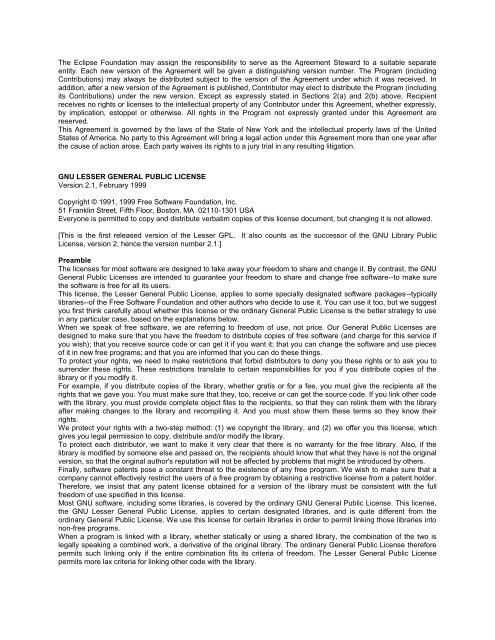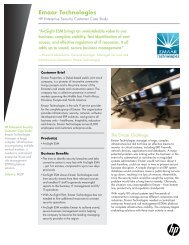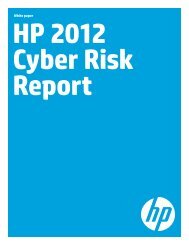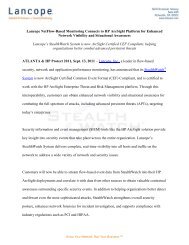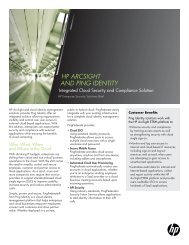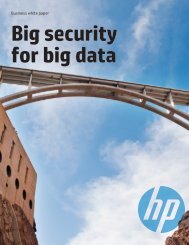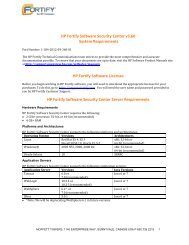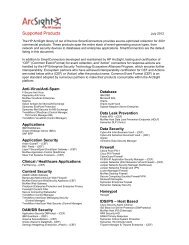Third Party Copyright Notices and License Terms HP ArcSight ...
Third Party Copyright Notices and License Terms HP ArcSight ...
Third Party Copyright Notices and License Terms HP ArcSight ...
Create successful ePaper yourself
Turn your PDF publications into a flip-book with our unique Google optimized e-Paper software.
The Eclipse Foundation may assign the responsibility to serve as the Agreement Steward to a suitable separate<br />
entity. Each new version of the Agreement will be given a distinguishing version number. The Program (including<br />
Contributions) may always be distributed subject to the version of the Agreement under which it was received. In<br />
addition, after a new version of the Agreement is published, Contributor may elect to distribute the Program (including<br />
its Contributions) under the new version. Except as expressly stated in Sections 2(a) <strong>and</strong> 2(b) above, Recipient<br />
receives no rights or licenses to the intellectual property of any Contributor under this Agreement, whether expressly,<br />
by implication, estoppel or otherwise. All rights in the Program not expressly granted under this Agreement are<br />
reserved.<br />
This Agreement is governed by the laws of the State of New York <strong>and</strong> the intellectual property laws of the United<br />
States of America. No party to this Agreement will bring a legal action under this Agreement more than one year after<br />
the cause of action arose. Each party waives its rights to a jury trial in any resulting litigation.<br />
GNU LESSER GENERAL PUBLIC LICENSE<br />
Version 2.1, February 1999<br />
<strong>Copyright</strong> © 1991, 1999 Free Software Foundation, Inc.<br />
51 Franklin Street, Fifth Floor, Boston, MA 02110-1301 USA<br />
Everyone is permitted to copy <strong>and</strong> distribute verbatim copies of this license document, but changing it is not allowed.<br />
[This is the first released version of the Lesser GPL. It also counts as the successor of the GNU Library Public<br />
<strong>License</strong>, version 2, hence the version number 2.1.]<br />
Preamble<br />
The licenses for most software are designed to take away your freedom to share <strong>and</strong> change it. By contrast, the GNU<br />
General Public <strong>License</strong>s are intended to guarantee your freedom to share <strong>and</strong> change free software--to make sure<br />
the software is free for all its users.<br />
This license, the Lesser General Public <strong>License</strong>, applies to some specially designated software packages--typically<br />
libraries--of the Free Software Foundation <strong>and</strong> other authors who decide to use it. You can use it too, but we suggest<br />
you first think carefully about whether this license or the ordinary General Public <strong>License</strong> is the better strategy to use<br />
in any particular case, based on the explanations below.<br />
When we speak of free software, we are referring to freedom of use, not price. Our General Public <strong>License</strong>s are<br />
designed to make sure that you have the freedom to distribute copies of free software (<strong>and</strong> charge for this service if<br />
you wish); that you receive source code or can get it if you want it; that you can change the software <strong>and</strong> use pieces<br />
of it in new free programs; <strong>and</strong> that you are informed that you can do these things.<br />
To protect your rights, we need to make restrictions that forbid distributors to deny you these rights or to ask you to<br />
surrender these rights. These restrictions translate to certain responsibilities for you if you distribute copies of the<br />
library or if you modify it.<br />
For example, if you distribute copies of the library, whether gratis or for a fee, you must give the recipients all the<br />
rights that we gave you. You must make sure that they, too, receive or can get the source code. If you link other code<br />
with the library, you must provide complete object files to the recipients, so that they can relink them with the library<br />
after making changes to the library <strong>and</strong> recompiling it. And you must show them these terms so they know their<br />
rights.<br />
We protect your rights with a two-step method: (1) we copyright the library, <strong>and</strong> (2) we offer you this license, which<br />
gives you legal permission to copy, distribute <strong>and</strong>/or modify the library.<br />
To protect each distributor, we want to make it very clear that there is no warranty for the free library. Also, if the<br />
library is modified by someone else <strong>and</strong> passed on, the recipients should know that what they have is not the original<br />
version, so that the original author's reputation will not be affected by problems that might be introduced by others.<br />
Finally, software patents pose a constant threat to the existence of any free program. We wish to make sure that a<br />
company cannot effectively restrict the users of a free program by obtaining a restrictive license from a patent holder.<br />
Therefore, we insist that any patent license obtained for a version of the library must be consistent with the full<br />
freedom of use specified in this license.<br />
Most GNU software, including some libraries, is covered by the ordinary GNU General Public <strong>License</strong>. This license,<br />
the GNU Lesser General Public <strong>License</strong>, applies to certain designated libraries, <strong>and</strong> is quite different from the<br />
ordinary General Public <strong>License</strong>. We use this license for certain libraries in order to permit linking those libraries into<br />
non-free programs.<br />
When a program is linked with a library, whether statically or using a shared library, the combination of the two is<br />
legally speaking a combined work, a derivative of the original library. The ordinary General Public <strong>License</strong> therefore<br />
permits such linking only if the entire combination fits its criteria of freedom. The Lesser General Public <strong>License</strong><br />
permits more lax criteria for linking other code with the library.


